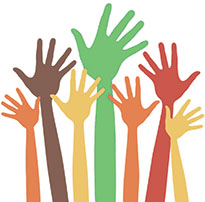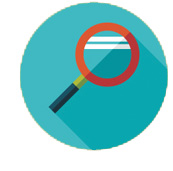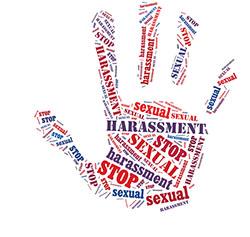RAISE E-News, Vol. 3, No. 6
DECEMBER 2017
|

Welcome to the RAISE e-news letter, designed to identify and share resources that the Rehabilitation Services Administration Parent Training and Information Centers (RSA-PTI) can use and share with families.
Executive Editor: Peg Kinsell
Visit our Website:
|
About RAISE
RAISE, the National Resources for Access, Independence, Self-Advocacy and Employment is a user-centered technical assistance center that understands the needs and assets of the RSA-PTIs, coordinates efforts with the TA provided by PTI centers and involves RSA-PTIs as key advisors and partners in all product and service development and delivery.
RAISE is funded by the US Department of Education to provide technical assistance to, and coordination of, the 7 PTI centers (RSA-PTIs). It represents collaboration between the nation's two Parent Technical Assistance Centers (PTAC) and the seven Regional PTACs.
Find your Parent Technical Assistance Center (PTAC)
|
|
 |
Harassment in School and the Workplace
"It took me quite a long time to develop a voice, and now that I have it, I am not going to be silent."
- Madeleine K. Albright, the first woman to become United States Secretary of State
With all the news about harassment and misconduct in the workplace, the editors of RAISE e-news decided to jump out of our editorial plan for this issue and into the frying plan of open discussion about harassment - sexual and otherwise - in the workplace and in school, and how it affects people with disabilities.
|
Anti-Bullying Alliance in Great Britain
Bullying and harassment go hand-in-hand. We love this simple whiteboard video about bullying produced by the
Anti-Bullying Alliance in Great Britain. Created for and by youth with disabilities, it offers a first person perspective on what to do if you have been bullied at school
.
And because it is such an important part of our world, we are sharing a second video, also from the Anti-Bullying Alliance on cyber bullying.
|
 A CLOSER LOOK: A CLOSER LOOK:
Sexual Assault and People with Disabilities
Did you know that people with disabilities are sexually assaulted at nearly three times the rate of people without disabilities?
60% of respondents to a recent survey had been subjected to some form of unwanted sexual activity, and almost half did not even report the assault. According to data from Disability Justice:
- 83% of women with disabilities will be raped or sexually assaulted in their lives, and half of these women will be assaulted more than 10 times.
- 30% of men with developmental disabilities have been sexually assaulted.
Only 3% of sexual abuses involving people with developmental disabilities are ever reported, but in order for this to stop, sexual violence must be reported. Educating individuals with disabilities, teachers, parents and service providers about sexual violence and the risks can increase reporting.
Ongoing sex education, as well as training in self-determination and relationship-building skills are key to helping youth with disabilities learn how to develop safe relationships- and recognize those that are unhealthy or dangerous.
|

TOOLS THAT WORK:
Understanding Sexual Harassment
This lesson plan can be shared with educators and schools. It is designed to help students better understand sexual harassment, identify examples of sexual harassment and consider appropriate responses to sexual harassment.
Is that sexual harassment?
Sexual harassment can be confusing, so here are some examples:
- Name calling, such as calling someone a 'slut' or a 'faggot.'
- Unwanted jokes, gestures, offensive words on clothing.
 Touching someone or bodily contact such as scratching, grabbing or patting someone's back, grabbing someone around the waist, or interfering with a person's ability to move. Even if it was intended as a joke or a prank, it is still harassment. Touching someone or bodily contact such as scratching, grabbing or patting someone's back, grabbing someone around the waist, or interfering with a person's ability to move. Even if it was intended as a joke or a prank, it is still harassment.- Repeated requests for dates or unwanted flirting. This can include stalking or getting in your personal space.
- Sending or posting pictures of a sexual nature.
- Displaying sexually suggestive objects, pictures, or posters.
- Playing sexually suggestive music.
- Pressure from a boss or teacher. If someone offers you a better grade, a raise or better hours at work in exchange for sex or some kind of physical favor, that's harassment.
- Hassling and teasing can be harassment too. If a classroom or workplace is made up of mostly guys who start picking on one of the few girls and making her life uncomfortable (or vice-versa), that could be termed sexual harassment.
Here is an animated video you can share with schools and transition coordinators to use with students.
|
 MAKING YOUR POINT MAKING YOUR POINT
Q: What if YOU are harassed?
A: If you feel like you're being sexually harassed at school or at work, call it sexual harassment. Schools and workplaces are responsible for stopping sexual harassment so they may take your concern more seriously if you call it sexual harassment. Here are some things you can do:
- Speak up. Tell your harasser to stop. Describe the words or actions that make you uncomfortable.
- Keep a record. Write down the name of the person who harassed you, what the person said or did, and how you responded. Write down the date and time, and where it happened. Keep copies of any harassing emails, texts, or online postings, too.
- Tell a parent or trusted adult or coworker. Sometimes it's hard to know whether events cross the line from teasing to sexual harassment. Talking to someone else can help you figure out what's happening and how to deal with it. If a boss starts scheduling you for early in the morning or late at night so the two of you are working alone, an adult in your life should know.
- Report it. Tell a teacher, staff member, principal or boss what happened. Share your records.
- Go legal. If the people you told don't take action to stop the problem, consider whether a lawsuit is necessary. It is always good to talk to a parent or trusted adult.
- Consider quitting the job if you feel unsafe.
Q: What if YOU are the harasser?
A: You might think you are just flirting a little, or making a joke. Maybe you are trying to ask someone out. Maybe you like giving hugs or just tend to stand close to people. Is that harassment? It all depends. Here are some guidelines:
-
Time and Place. Jokes or comments that are OK with good friends at home may not be OK with someone you don't know, or at work.
-
Do Not Touch. At work, it is best not to touch or hug people -- especially in a personal manner. And be sure to keep your distance when standing near other.
-
R-E-S-P-E-C-T. If someone asks you to stop saying or doing something that's bothering them, stop right away and apologize.
-
Don't Spread Rumors. Respectfulness also means not spreading rumors. Don't share personal details or sexy photos that would embarrass someone.
We think this 2-minute video from GetCourse is fun and makes the point about what NOT to do in a workplace.
This is a great piece to share with educators and parents who are concerned that body language and social skills may result in misunderstandings at work.
|
 WANT MORE? WANT MORE?
Our RAISE partners at
INLCUDEncy alerted us to these three terrific articles, both to deepen your own understanding, and to share with transition leaders you work with.
This piece from Teen Vogue on the importance of sex education for youth with disabilities goes a long way. Take time to read the section on Power Dynamics and Consent - well worth the read.
And
this 2015 piece from The Atlantic looks at how misperceptions about disability can prevent people with disabilities from being able to express themselves sexually. It too, touches on the importance of consent:
|
|